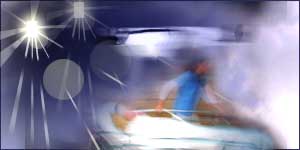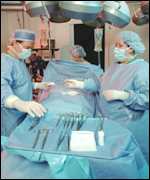|
Evidence of 'life after death'
October 23, 2000 - BBC
Scientists investigating 'near-death' experiences say they have
found evidence to suggest that consciousness can continue to exist after the brain has ceased to function.
However, the claim has been challenged by neurological experts.
The researchers interviewed 63 patients who had survived heart attacks
within a week of the experience.
Of these 56 had no recollection of the period of unconsciousness
they experienced whilst, effectively, clinically dead.
However, seven had memories, four of which counted as near-death
experiences.
They told of feelings of peace and joy, time speeded up, heightened
senses, lost awareness of body, seeing a bright light, entering another world, encountering a mystical being and coming to
"a point of no return".
None of the patients were found to be receiving low oxygen levels
- which some scientists believe may be responsible for so-called "near-death" experiences.
Lead researcher Dr Sam Parnia, of Southampton General Hospital,
said nobody fully understands how brain cells generate thoughts.
He said it might be that the mind or consciousness is independent
of the brain.
He said: "When we examine brain cells we see that brain cells are
like any other cells, they can produce proteins and chemicals, but they are not really capable of producing the subjective
phenomenon of thought that we have.
"The brain is definitely needed to manifest the mind, a bit like
how a television set can take what essentially are waves in the air and translate them into picture and sound."
Dr Chris Freeman, consultant psychiatrist and psychotherapist at
Royal Edinburgh Hospital, said there was no proof that the experiences reported by the patients actually occurred when the
brain was shut down.
"We know that memories are extremely fallible. We are quite good
at knowing that something happened, but we are very poor at knowing when it happened.
"It is quite possible that these experiences happened during the
recovery, or just before the cardiac arrest. To say that they happened when the brain was shut down, I think there is little
evidence for that at all."
Life after near death

More people are now brought back from the brink
February 4, 2000 - BBC News
From the corner of the room, Christine Ellingham says she could
see emergency medical staff crowding around an unconscious body.
They were desperately trying to revive the woman, and to save her
unborn baby.
"I knew that it was me lying on the table. But I was outside of
my body, floating in the corner of the room. I was very calm and it made perfect sense to me that I should be watching what
I understood to be the final moments of my life.

"I felt absolute peace and serenity. There was light around me and
it grew and grew until I couldn't see my body any more.
"Then I felt an amazing sensation of rushing forwards through the
light, or rather that the light was rushing back over me. I couldn't see him, but I knew that my father, who had died four
years previously, was there with me, and I felt totally, totally safe."
"I felt that my father was almost carrying me, like I was a child
again, and then the light slowed and stopped and my father told me that my baby needed me. I felt very sad that I had to leave,
but I wanted to be with my baby.
"There was another instant where I was still surrounded by light,
and then, bang! I slammed backwards."
She said that the next thing she experienced was "excruciating pain"
- and her eyes opened and she saw the nurses she said she had seen from behind just moments ago.
"I cried and cried. I was in so much pain, but I felt an elation
and a certainty that both me and my baby were going to live."
Christine underwent an emergency Caesarian operation, and her son
Liam, her first child, was born six weeks early. She said that she had been planning to go back to work as soon as possible,
but instead decided to look after Liam full-time.
he said: "I was spared, and I was spared to look after Liam. I have
never been a religious person, but the experience has made me feel secure that there is an afterlife, and the people that
I love and have passed away are still there, watching over me and my family."
Professor Paul Badham of Lampeter University - who studies the philosophical
implications of near death experiences - said that despite media hype, the phenomenon is quite rare.
However, he says the reports of people who have had near death experiences
tend to contain similar elements.
"It is very common for people to report going out of their body
and looking down on their body," he said
"Going through a tunnel is also a common experience, as is being
surrounded by light. The meeting of deceased relatives or friends is also commonly reported.
"People will also say that they feel they are in the presence of
a spiritual reality. A Christian may interpret this as Jesus. One atheist who had an out of body experience said that he later
realized that this presence was responsible for the governance of the universe."
Prof Badham said that the numbers of people experiencing the phenomena
are rising, as medicine improves and pulls more people back from the brink.
He says that people who report near death experience sometimes "see"
things that it would have been impossible for them to see if they had been unconscious on an operating table.
He said: "Not everyone who is near death has this experience - it
just does not follow that it is a last physical response to death.
"This is an experience which transcends cultures, religions and
classes - I believe this experience is probably the base for our belief in an afterlife."
| 
